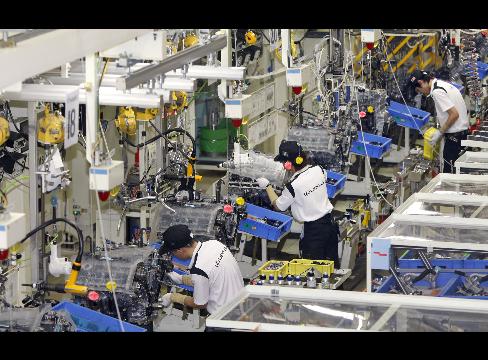
Workers assemble engines of Toyota Motor Corp.’s Lexus LS600 hybrid sedan on the production line at its Tahara plant in Tahara, central Japan, on June 28, 2007. Photographer: Kimimasa Mayama/Bloomberg News
Nov. 21 (Bloomberg) — Toyota Motor Corp., Japan’s biggest carmaker, will cut its domestic temporary workforce by 50 percent as vehicle demand slumps globally.
Toyota will cut the number of temporary workers to 3,000 from 6,000 by the end of March, spokesman Paul Nolasco said today in a phone interview.
The automaker follows Mazda Motor Corp. and Isuzu Motors Ltd., which yesterday said they would slash a combined 2,700 temporary jobs in Japan in response to slowing sales. Earlier this month, Toyota forecast a 68 percent drop in full-year net income, the biggest decline in at least 18 years, as a global recession cripples auto demand.
“Falling export demand is having a big impact on production in Japan,” said Hirofumi Yokoi, a Tokyo-based analyst at automotive consulting company CSM Worldwide. “It’s unlikely plants will get shut down, but if things get worse, lines, shifts will have to be stopped and plans for new factories will be delayed.”
Japanese companies, which focused on hiring easy-to-fire contract workers during the 15 years of lackluster economic growth that followed the bursting of the bubble economy in 1990, are now shedding them as the global recession cuts demand. Temporary and part-time workers make up 33 percent of Japan’s workforce, up from 20 percent in 1991, according to the Labor Ministry.
Honda, Nissan
Honda Motor Co., Japan’s second-largest carmaker, also said today it is cutting 270 temporary workers at its Saitama plant, where the carmaker is reducing output of Accord sedans by 40,000 units. Honda is also cutting production in the U.K. of Civic compacts and CR-V sport-utility vehicles by 21,000 units.
Nissan Motor Co. said last week it will reduce its domestic production by an additional 72,000 units. Japan’s third-largest automaker had its credit rating cut one notch today by Fitch Ratings, which cited the company’s dependence on the weak U.S. auto market and an appreciation of the yen.
Toyota gained 4.6 percent to 3,080 yen at the close of trading today in Tokyo. The shares have dropped 49 percent this year, set for the worst annual performance since at least 1975.
Credit Crunch
The credit crunch has crippled U.S. vehicle sales, forcing General Motors Corp., Ford Motor Co. and Chrysler LLC to seek a combined $25 billion in U.S. government loans as they burn through cash. U.S. unemployment claims for the week ended Nov. 15 surged to the highest since 1992 as Americans filed 542,000 initial jobless claims.
Japan’s exports declined at the fastest pace in almost seven years in October, and Toyota’s U.S. sales plunged 23 percent last month.
Toyota, heading for its first drop in U.S. sales in 13 years, will extend the Christmas-New Year closure at its U.S. and Canadian plants by two days. The carmaker will also cut Sienna minivan output in Indiana by half in January and slow one of two Georgetown, Kentucky, factory lines.
While no full-time employees will be laid off, the company will eliminate at least 50 percent of its 500 temporary workers at the Georgetown plant during the first three months of 2009.
To contact the reporter on this story: Makiko Kitamura in Tokyo at [email protected].
Last Updated: November 21, 2008 03:26 EST
By Makiko Kitamura
Source: Bloomberg